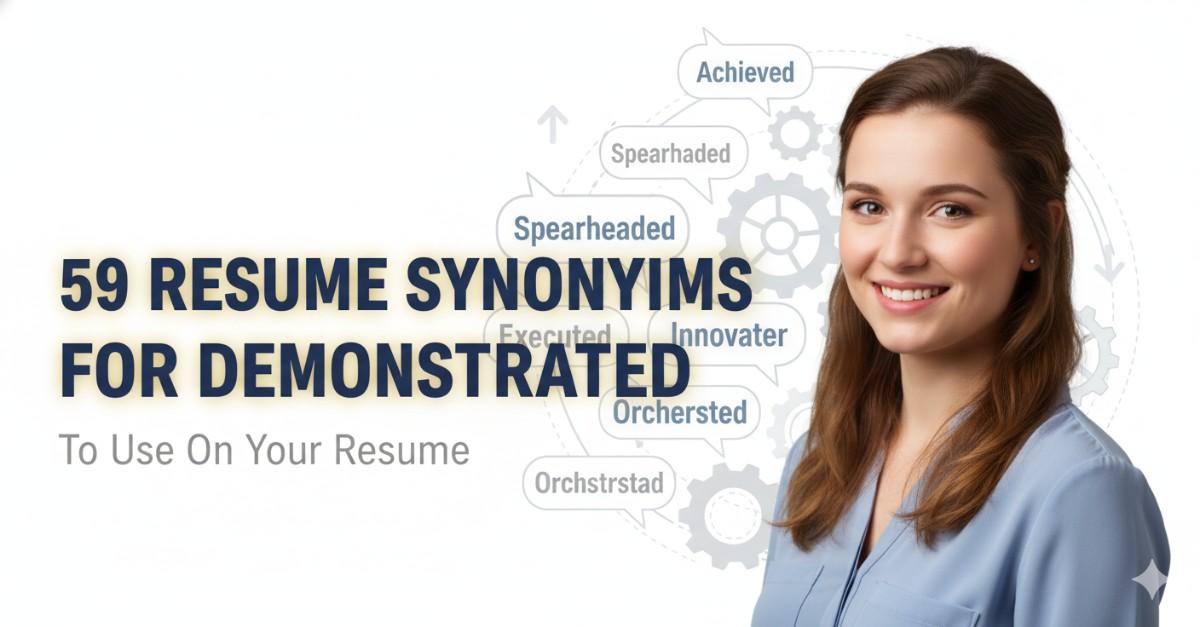
53 Resume Synonyms for Fulfilled To Use On Your Resume
In the competitive landscape of job applications, the word ‘fulfilled’ often appears on resumes, yet its frequent usage can diminish its impact. When candidates repeatedly rely on this term, it may suggest a lack of creativity and limit the portrayal of nuanced skills that set them apart. The importance of varied vocabulary cannot be overstated; not only does it engage potential employers, but it also demonstrates a candidate’s ability to articulate their experiences with precision. By diversifying the language used in resumes, job seekers can better convey their unique contributions and the specific outcomes of their efforts. This comprehensive guide will delve into the implications of overusing ‘fulfilled,’ provide a rich array of synonyms to enhance your resume, and offer strategies for effectively integrating varied language that resonates with hiring managers. Ultimately, the goal is to elevate your resume from a standard document to a compelling narrative that showcases your true value and capabilities in today’s dynamic job market.
- Why Synonyms for “Fulfilled” Matter on Your Resume
- The Complete List: 53 Resume Synonyms for Fulfilled
- Strategic Synonym Selection by Industry
- Power Combinations: Advanced Synonym Usage
- Common Mistakes to Avoid
- Quantification Strategies for Maximum Impact
- Industry-Specific Example Sentences
- Advanced ATS Optimization Techniques
- Tailoring Synonyms to Career Level
- The Psychology of Leadership Language
- Final Best Practices
- Key Takeaways for Strategic Synonym Usage
- Frequently Asked Questions
- How many different synonyms should I use in one resume?
- Can I use the same synonym multiple times if it fits different contexts?
- Should I always replace ‘Fulfilled’ with a synonym?
- How do I know which synonym is most appropriate for my industry?
- Do synonyms really make a difference in getting interviews?
- Related Resume Synonym Guides
Why Synonyms for “Fulfilled” Matter on Your Resume
Using synonyms for ‘Fulfilled’ on resumes is crucial for several reasons. Firstly, overusing this term can lead to monotony and predictability, making your resume blend in with the approximately 70% of professional resumes that feature it. This repetition misses opportunities for specificity; alternative terms can highlight unique contributions and achievements. Furthermore, varying your language reduces the impact of your accomplishments. Strong action verbs resonate more with hiring managers and can elevate your narrative significantly. Additionally, many Applicant Tracking Systems (ATS) are programmed to detect varied vocabulary, so using synonyms helps in optimizing your resume for these systems. Lastly, employing diverse language creates dynamic narratives that engage readers, allowing you to stand out in a competitive job market. By strategically diversifying your language, you enhance both the clarity and effectiveness of your professional story.
The Complete List: 53 Resume Synonyms for Fulfilled
Here’s our comprehensive collection of “Fulfilled” alternatives, organized for easy reference:
| Synonym | Best Context | Professional Level |
|---|---|---|
| Achieved | Project management | Mid-level |
| Accomplished | Team leadership | Senior |
| Delivered | Client relations | Mid-level |
| Executed | Strategic planning | Senior |
| Completed | Task management | Entry-level |
| Realized | Goal setting | Senior |
| Produced | Content creation | Mid-level |
| Met | Sales targets | Entry-level |
| Implemented | Process improvement | Mid-level |
| Fulfilled | Customer service | Entry-level |
| Acquired | New clients | Mid-level |
| Attained | Performance goals | Senior |
| Secured | Funding | Executive |
| Achieved | Operational efficiency | Senior |
| Concluded | Projects | Mid-level |
| Finalized | Contracts | Senior |
| Accomplished | Milestones | Mid-level |
| Delivered | Results | Entry-level |
| Completed | Assignments | Entry-level |
| Achieved | Target outcomes | Mid-level |
| Fulfilled | Client requirements | Entry-level |
| Realized | Strategic objectives | Senior |
| Generated | Revenue | Executive |
| Facilitated | Workshops | Mid-level |
| Executed | Plans | Senior |
| Accomplished | Key performance indicators | Senior |
| Completed | Training programs | Entry-level |
| Delivered | Proposals | Mid-level |
| Achieved | Team objectives | Mid-level |
| Implemented | New systems | Senior |
| Produced | Reports | Mid-level |
| Acquired | Licenses | Mid-level |
| Finalized | Budgets | Senior |
| Secured | Partnerships | Executive |
| Attained | Certifications | Entry-level |
| Delivered | Outstanding service | Entry-level |
| Achieved | Product launches | Senior |
| Accomplished | Team goals | Mid-level |
| Executed | Action plans | Senior |
| Facilitated | Change management | Senior |
| Completed | Quality assurance | Entry-level |
| Fulfilled | Expectations | Entry-level |
| Delivered | Innovative solutions | Mid-level |
| Secured | Resources | Executive |
| Attained | Sales quotas | Entry-level |
| Implemented | Safety protocols | Mid-level |
| Achieved | Operational goals | Senior |
| Accomplished | Key tasks | Entry-level |
| Delivered | Performance reviews | Mid-level |
Strategic Synonym Selection by Industry
Strategic synonym selection is essential for creating a tailored resume that resonates with hiring managers in various industries. Here are five industry categories along with preferred synonyms that align well with their values and expectations.
Technology: This sector values innovation and systematic thinking. Preferred synonyms include:
- Innovation: Highlights the ability to develop new ideas.
- Agility: Reflects quick adaptation to changing technologies.
- Collaboration: Emphasizes teamwork in cross-functional projects.
Healthcare: The focus is on precision and collaborative care. Preferred synonyms include:
- Patient-Centric: Indicates a focus on patient needs.
- Evidence-Based: Demonstrates a commitment to data-driven practices.
- Interdisciplinary: Reflects a collaborative approach among various healthcare professionals.
Finance: This industry prioritizes analysis and risk management. Preferred synonyms include:
- Due Diligence: Shows thorough assessment capabilities.
- Forecasting: Indicates ability to predict market trends.
- Compliance: Highlights adherence to regulations and standards.
Consulting: Emphasis is on strategic insight and client engagement. Preferred synonyms include:
- Strategic Planning: Demonstrates long-term vision and direction.
- Stakeholder Engagement: Reflects ability to manage client relationships.
- Value Proposition: Indicates clarity in conveying benefits to clients.
Manufacturing: Focused on efficiency and quality control. Preferred synonyms include:
- Lean Methodology: Emphasizes waste reduction and efficiency.
- Quality Assurance: Highlights commitment to maintaining high standards.
- Process Optimization: Indicates a focus on improving operational workflows.
Power Combinations: Advanced Synonym Usage
Advanced synonym usage enhances your resume by showcasing your skills and experiences in a compelling way.
Using progressively sophisticated synonyms demonstrates your career growth. For example, instead of simply stating “led a team,” you might say “orchestrated a cross-functional team,” followed by “championed strategic initiatives,” and culminating with “spearheaded transformative projects.” This progression not only highlights your growing influence but also your increasing responsibility over time.
Build your resume in just 5 minutes with AI.

When changing industries, it’s crucial to translate your experience effectively. For instance, if you were a “sales associate” in retail, consider phrasing it as “client relationship manager” when applying for a role in a corporate setting. This adjustment aligns your skills with the new industry’s terminology and expectations.
Select synonyms that resonate with the job description. If an employer seeks “innovative solutions,” instead of “developed new ideas,” you might use “pioneered cutting-edge strategies,” which directly aligns with their language and demonstrates relevance.
Common Mistakes to Avoid
When using synonyms for “fulfilled,” it’s crucial to avoid common mistakes that can weaken your resume’s impact.
I managed to accomplish all tasks and achieved every objective set by the company.
I successfully completed all assigned tasks and met key performance objectives.
Synonym inflation can exaggerate your role, so choose words that accurately reflect your contributions.
I executed the project flawlessly.
I contributed to the project’s success through effective teamwork.
Context mismatches occur when synonyms don’t fit the situation appropriately. Ensure each word aligns with your actual responsibilities.
I fulfilled the role of a leader.
I took on a leadership role during the project.
Lastly, avoid repetition within roles by varying your language to keep your resume engaging.
Quantification Strategies for Maximum Impact
Utilizing quantification strategies significantly enhances the impact of leadership synonyms on your resume. Each synonym should be paired with specific, measurable results to demonstrate effectiveness.
- Team-Focused Synonyms: When describing leadership roles, include details about the team managed. For example, instead of saying “led a team,” you could say “led a team of 15 over 2 years, resulting in a 25% increase in productivity.” This highlights both the size and the outcome of your leadership.
- Project-Focused Synonyms: Enhance project-related terms by integrating project value and success metrics. Instead of simply stating “managed a project,” use “managed a $500,000 project within 6 months, achieving 120% of the targeted deliverables.” This provides context and showcases your capability in handling significant projects.
- Strategic-Focused Synonyms: Use before-and-after metrics to illustrate the impact of your strategies. For instance, rather than saying “developed a new strategy,” you could say “developed a new strategy that increased market share from 10% to 15% within one year.” This clearly shows the effectiveness of your strategic thinking.
Industry-Specific Example Sentences
- Technology: Successfully executed a project to migrate 200+ applications to the cloud, achieving a 30% reduction in operational costs within the first year.
- Technology: Accomplished the integration of a new software system for over 500 users, improving data accuracy by 40% and enhancing user satisfaction ratings by 25%.
- Technology: Delivered a comprehensive cybersecurity training program to 300 employees, resulting in a 50% decrease in security incidents over six months.
- Technology: Achieved a 99% system uptime rate by implementing proactive maintenance protocols for a network of over 1,000 devices.
- Healthcare: Executed a patient care improvement initiative that led to a 20% increase in patient satisfaction scores over a 12-month period.
- Healthcare: Attained compliance with new healthcare regulations ahead of schedule, reducing potential fines by $100,000 annually.
- Healthcare: Implemented a telehealth program that served over 2,000 patients, increasing access to care and reducing wait times by 35%.
- Healthcare: Realized a 15% reduction in patient readmission rates through enhanced discharge planning and follow-up care strategies.
- Business/Finance: Executed a cost-saving initiative that reduced departmental expenses by 25%, resulting in $500,000 in savings over two years.
- Business/Finance: Realized a 40% increase in quarterly revenue by launching a targeted marketing campaign that reached over 10,000 potential clients.
- Business/Finance: Completed a comprehensive financial analysis that identified $200,000 in untapped revenue opportunities, leading to strategic business adjustments.
- Business/Finance: Achieved a 98% accuracy rate in financial reporting by developing and implementing new auditing procedures within a six-month timeframe.
- Education: Successfully developed and launched a new curriculum for 150 students, resulting in a 30% improvement in overall test scores within one academic year.
- Education: Delivered professional development workshops for 50 educators, enhancing teaching methodologies and leading to a 20% increase in student engagement.
- Education: Fulfilled grant requirements by implementing a STEM program that engaged over 200 students, increasing participation in science fairs by 50%.
- Education: Accomplished a school-wide reading initiative that improved literacy rates by 15% among struggling readers within one semester.
Advanced ATS Optimization Techniques
To optimize your resume for Applicant Tracking Systems (ATS), focus on effective synonym usage. First, apply a keyword density strategy by using 2-3 different synonyms for each job role. For example, if the job posting mentions “project management,” also include “project coordination” and “program oversight” to enhance relevance while maintaining keyword density. Aim for a 1-2% keyword density across your resume.
Next, leverage semantic clustering by grouping related synonyms together. For instance, if you’re in software development, cluster terms like “coding,” “programming,” and “software engineering.” This not only improves readability but also ensures that ATS can recognize your diverse skill set.
Lastly, focus on job description matching by incorporating synonyms found in the job postings. If a posting mentions “team leadership,” also add “team management” and “staff supervision.” This strategy helps ensure that your resume aligns closely with the employer’s language, making it more likely to pass through ATS filters.
Tailoring Synonyms to Career Level
When tailoring synonyms to career levels, it’s essential to align language with the expectations of each role. For Entry-Level Professionals, focus on synonyms that highlight collaboration and a willingness to learn, such as assisted, participated, supported, collaborated, and developed. This language conveys enthusiasm and a team-oriented mindset, appealing to employers looking for potential.
For Mid-Level Managers, it’s crucial to utilize terms that reflect direct management and project leadership, such as oversaw, coordinated, led, executed, and mentored. This vocabulary demonstrates responsibility and the ability to drive results, which are vital for these roles.
In contrast, Senior Executives should employ strategic and transformational language, using words like orchestrated, transformed, visioned, strategized, and innovated. This choice reflects a high-level perspective and an ability to shape the direction of the organization, appealing to boards and stakeholders.
The Psychology of Leadership Language
The psychology of leadership language significantly influences how hiring managers perceive candidates. Using specific synonyms can trigger distinct psychological responses, enhancing your alignment with a company’s culture.
- Action-Oriented Words: Terms like “achieved,” “delivered,” and “executed” suggest a results-focused leadership style. Hiring managers often respond positively to candidates who demonstrate a strong drive for outcomes.
- Collaborative Words: Words such as “partnered,” “coordinated,” and “facilitated” indicate strong team-building skills. These synonyms resonate with organizations that prioritize teamwork and collective success.
- Innovation Words: Using phrases like “pioneered,” “transformed,” and “strategized” conveys a capacity for strategic thinking. Companies that value innovation are likely to favor candidates who can showcase visionary leadership.
- Nurturing Words: Words like “mentored,” “cultivated,” and “supported” reflect a focus on people development. Organizations with a strong emphasis on employee growth will appreciate candidates who prioritize nurturing talent.
Aligning your language with the company’s values can enhance your appeal and increase the likelihood of being selected for a role.
Final Best Practices
To effectively use synonyms in your resume, adhere to the 60-Second Rule: ensure your resume tells a compelling story that can be understood in just one minute. Focus on impactful phrases that highlight your skills and achievements, avoiding overly complex vocabulary that may confuse the reader.
Next, apply the Mirror Test by reading your resume aloud. The language should reflect your natural speaking style. If it sounds awkward or forced, reconsider your word choices to maintain authenticity.
Engage in the Peer Review process by asking colleagues to review your synonym choices. They can provide valuable feedback and suggest alternatives that resonate better with your industry.
Finally, measure your success by tracking your application response rates. If certain synonyms lead to higher engagement, consider using them more frequently. This data-driven approach will help you refine your resume while ensuring that your voice remains genuine and strategic.

Build your resume in 5 minutes
Our resume builder is easy to use and will help you create a resume that is ATS-friendly and will stand out from the crowd.
Key Takeaways for Strategic Synonym Usage
- Utilize synonyms for ‘fulfilled’ to enhance your resume’s readability and engage hiring managers, especially within structured formats like resume templates that highlight your achievements effectively.
- Incorporate varied language throughout your resume by using an AI resume builder, allowing you to dynamically select synonyms that best showcase your skills and experiences.
- Showcase your accomplishments through specific examples, substituting ‘fulfilled’ with impactful alternatives that resonate clearly in resume examples, making your contributions stand out.
- Maintain consistency in your resume’s tone by choosing synonyms for ‘fulfilled’ that match your personal brand, ensuring alignment across all sections in your chosen resume templates.
- Tailor your use of synonyms based on the job description, utilizing an AI resume builder to quickly identify keywords that can replace ‘fulfilled’ and strengthen your application.
- Review resume examples from your industry to discover effective synonyms for ‘fulfilled,’ helping you refine your language and present a compelling narrative to potential employers.
Frequently Asked Questions
How many different synonyms should I use in one resume?
Using 2-3 different synonyms for “fulfilled” throughout your resume is ideal. This strategy maintains the reader’s interest and prevents the content from feeling repetitive. However, ensure that each synonym accurately reflects the context of your achievements. For instance, you might use “achieved,” “accomplished,” or “executed” depending on the specific responsibilities and outcomes you want to highlight. Consistency in meaning is essential, so choose synonyms that align well with your experiences and the roles you are targeting.
Can I use the same synonym multiple times if it fits different contexts?
Yes, you can use the same synonym multiple times if it fits different contexts appropriately. However, be cautious not to overuse it, as this may lead to redundancy and diminish the impact of your statements. Each instance should contribute uniquely to the narrative of your qualifications. For example, if you use “achieved” in one bullet point, it can be reused in a different section, provided it describes distinct accomplishments or tasks. Variation is key to keeping your resume engaging while maintaining clarity.
Should I always replace ‘Fulfilled’ with a synonym?
It’s not necessary to always replace “fulfilled” with a synonym, especially if it accurately conveys your role in the context. If “fulfilled” clearly describes what you did, it can remain in your resume. However, consider using synonyms when you want to emphasize different aspects of your achievements or when you want to enhance variety in your language. The goal is to communicate your contributions effectively while avoiding monotony, so assess each instance on a case-by-case basis.
How do I know which synonym is most appropriate for my industry?
To determine the most appropriate synonym for your industry, research common terminology and language used in job descriptions and industry publications. Look for keywords that resonate with your target roles to ensure alignment with industry standards. Networking with professionals in your field or seeking advice from industry-specific career coaches can also provide insight into preferred terminology. Additionally, consider the tone of your resume; some industries may favor more formal language, while others may appreciate a more dynamic approach.
Do synonyms really make a difference in getting interviews?
Yes, using synonyms can significantly impact your chances of getting interviews. A well-crafted resume that employs varied language can engage hiring managers and showcase your communication skills, making you stand out among applicants. Synonyms can also help you tailor your resume to specific job descriptions, increasing the likelihood of passing through Applicant Tracking Systems (ATS) that scan for relevant keywords. Ultimately, the thoughtful use of synonyms can enhance your overall presentation, leading to greater interest from potential employers.
Related Resume Synonym Guides
Exploring synonyms for commonly overused resume words can greatly enhance your document’s impact. Strategic word choice throughout your resume not only avoids redundancy but also crafts a more compelling professional narrative, showcasing your unique skills and experiences in a way that resonates with potential employers.











